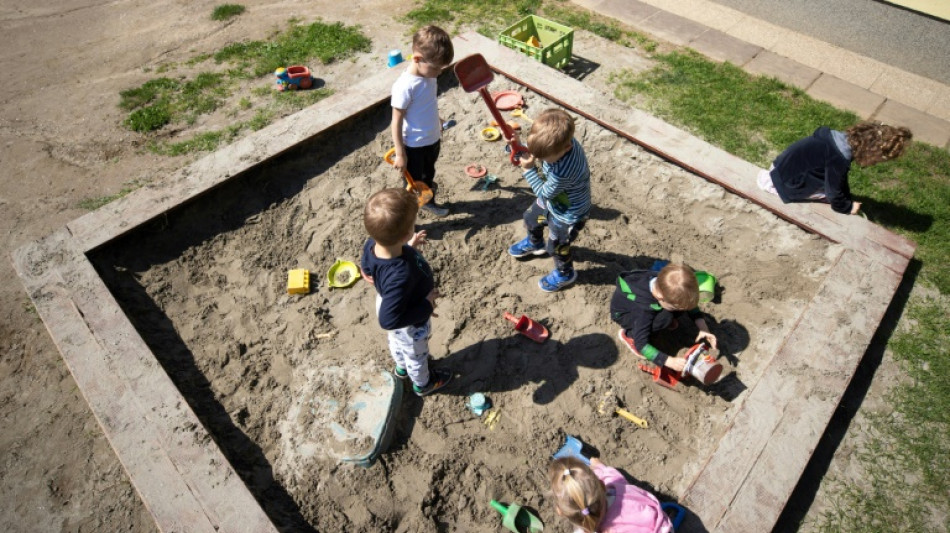
-
 Library user borrows rare Chinese artwork, returns fakes: US officials
Library user borrows rare Chinese artwork, returns fakes: US officials
-
Parisians hot under the collar over A/C in apartments
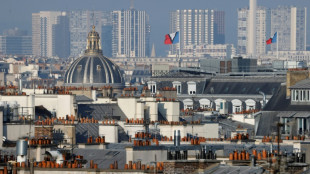
-
 Crypto group reportedly says it planned sex toy tosses at WNBA games
Crypto group reportedly says it planned sex toy tosses at WNBA games
-
American Shelton tops Khachanov to win first ATP Masters title in Toronto

-
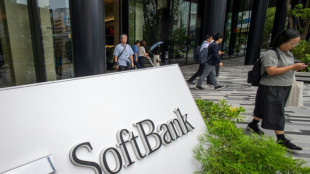 Tokyo soars on trade deal relief as Asian markets limp into weekend
Tokyo soars on trade deal relief as Asian markets limp into weekend
-
New species teem in Cambodia's threatened karst

-
 Australian mushroom murderer accused of poisoning husband: police
Australian mushroom murderer accused of poisoning husband: police
-
Solid gold, royal missives and Nobel noms: how to win Trump over

-
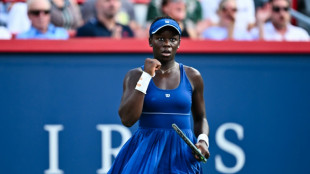 Canadian teen Mboko outlasts Osaka to win WTA Montreal crown
Canadian teen Mboko outlasts Osaka to win WTA Montreal crown
-
Trump to host Armenia, Azerbaijan for historic 'Peace Signing'

-
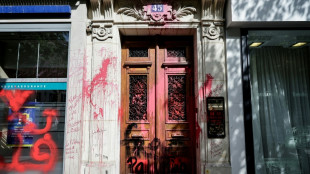 Israeli airline's Paris offices daubed with red paint, slogans
Israeli airline's Paris offices daubed with red paint, slogans
-
US raises bounty on Venezuela's Maduro to $50 mn
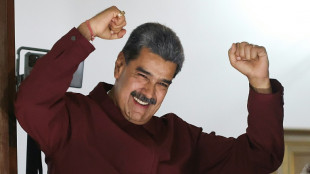
-
 Lebanon cabinet meets again on Hezbollah disarmament
Lebanon cabinet meets again on Hezbollah disarmament
-
France's huge wildfire will burn for days: authorities

-
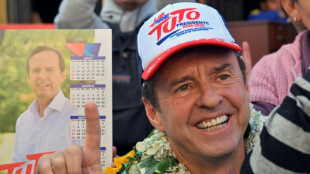 Bolivia right-wing presidential hopeful vows 'radical change'
Bolivia right-wing presidential hopeful vows 'radical change'
-
Trump says would meet Putin without Zelensky sit-down

-
 Trump offers data to justify firing of labor stats chief
Trump offers data to justify firing of labor stats chief
-
Bhatia leads by one at PGA St. Jude, Scheffler five adrift

-
 Disney settles Trump-supporting 'Star Wars' actor lawsuit
Disney settles Trump-supporting 'Star Wars' actor lawsuit
-
Trump moves to kill $7 billion in solar panel grants

-
 Venus Williams falls at first hurdle in Cincinnati
Venus Williams falls at first hurdle in Cincinnati
-
Mixed day for global stocks as latest Trump levies take effect

-
 SpaceX agrees to take Italian experiments to Mars
SpaceX agrees to take Italian experiments to Mars
-
US judge orders temporary halt to new 'Alligator Alcatraz' construction
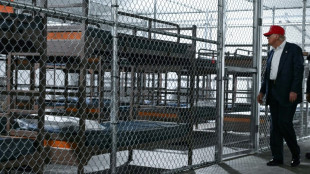
-
 US uses war rhetoric, Superman to recruit for migrant crackdown
US uses war rhetoric, Superman to recruit for migrant crackdown
-
US to rewrite its past national climate reports
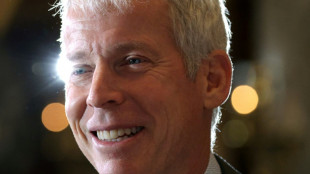
-
 U can't pay this: MC Hammer sued over delinquent car loan
U can't pay this: MC Hammer sued over delinquent car loan
-
WHO says nearly 100,000 struck with cholera in Sudan
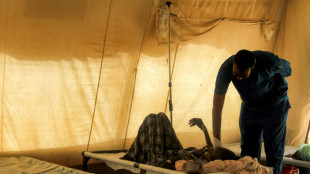
-
 Huge wildfire in southern France now under control
Huge wildfire in southern France now under control
-
Kane scores as Bayern thump Spurs in pre-season friendly

-
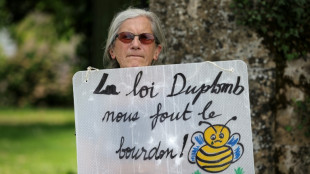 France strikes down return of banned bee-killing pesticide
France strikes down return of banned bee-killing pesticide
-
Canada sends troops to eastern province as fire damage grows

-
 OpenAI releases ChatGPT-5 as AI race accelerates
OpenAI releases ChatGPT-5 as AI race accelerates
-
Plastic pollution treaty talks deadlocked
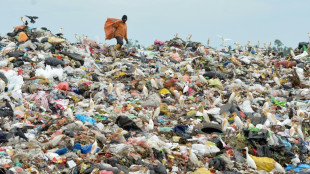
-
 A French sailor's personal 'Plastic Odyssey'
A French sailor's personal 'Plastic Odyssey'
-
Netanyahu says Israel to control not govern Gaza
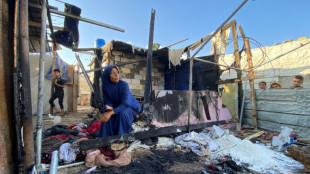
-
 Partey signs for Villarreal while on bail for rape charges
Partey signs for Villarreal while on bail for rape charges
-
Wales have the talent to rise again, says rugby head coach Tandy

-
 US partners seek relief as Trump tariffs upend global trade
US partners seek relief as Trump tariffs upend global trade
-
Five England players nominated for women's Ballon d'Or

-
 PSG dominate list of men's Ballon D'Or nominees
PSG dominate list of men's Ballon D'Or nominees
-
Americans eating (slightly) less ultra-processed food

-
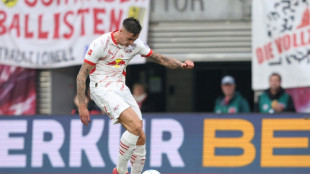 Man Utd agree 85m euro deal to sign Sesko: reports
Man Utd agree 85m euro deal to sign Sesko: reports
-
France to rule on controversial bee-killing pesticide bill
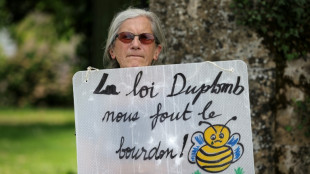
-
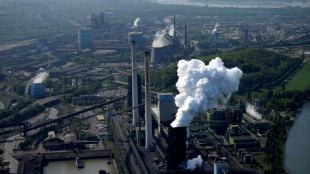 Germany factory output falls to lowest since pandemic in 2020
Germany factory output falls to lowest since pandemic in 2020
-
Swiss to seek more talks with US as 'horror' tariffs kick in
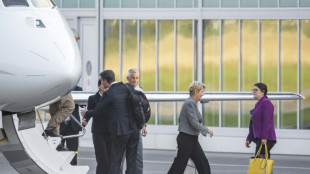
-
 Barcelona strip Ter Stegen of captain's armband
Barcelona strip Ter Stegen of captain's armband
-
Trump demands new US census as redistricting war spreads

-
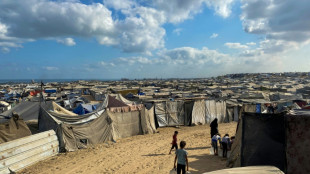 'How much worse could it get?' Gazans fear full occupation
'How much worse could it get?' Gazans fear full occupation
-
France seeks to 'stabilise' wildfire raging in south

| RBGPF | -5.79% | 71.84 | $ | |
| RYCEF | -0.42% | 14.44 | $ | |
| NGG | -0.31% | 72.08 | $ | |
| RELX | 1.03% | 49.32 | $ | |
| SCU | 0% | 12.72 | $ | |
| BP | 0.91% | 34.19 | $ | |
| CMSC | 0.04% | 22.96 | $ | |
| AZN | 1.3% | 74.57 | $ | |
| CMSD | -0.09% | 23.52 | $ | |
| BTI | 0.51% | 56.69 | $ | |
| SCS | 0.06% | 16 | $ | |
| VOD | -0.36% | 11.26 | $ | |
| RIO | 1.12% | 60.77 | $ | |
| GSK | 2.21% | 37.58 | $ | |
| BCC | 0.32% | 83.19 | $ | |
| BCE | 2.23% | 23.78 | $ | |
| JRI | 0.52% | 13.41 | $ |

Croatian town pays grandparents for childcare
A Croatian town has come up with a novel solution to solve the dilemma of working parents when there are no public childcare spaces available: pay grandparents to do it.
Samobor, near the capital Zagreb, has become the first in the country to run a "Grandmother-Grandfather Service", which pays 360 euros ($400) a month per child.
The scheme allows grandparents to top up their pension, but the authorities also hope it will boost family ties and tackle social isolation as the population ages.
"The benefits are multiple," Samobor's mayor, Petra Skrobot, told AFP.
"Pensions are rather low and for parents it is sometimes difficult to find adequate care for children.
"We wanted to give the parents the possibility to choose the type of care for their children."
In Croatia, most women use 12 months of maternity leave, though state-funded childcare is available from the age of six months until the child enrols at primary school at age six.
But there are not enough places in public kindergartens, which are run by the authorities at the local level, meaning several thousand children miss out every year.
The problem is most acute in major cities, particularly Zagreb, and many working parents face a choice between paying for a private kindergarten or a nanny out of their own pocket -- or asking their own parents to help.
The "Grandmother-Grandfather Service", based on a similar model in Sweden, is open to children aged four and under.
Grandparents apply for the measure, which was introduced in late March, every month. Twenty-eight people have so far applied.
- 'Deepening bonds' -
Dubravka Koletic, 60, was one of them. She praised the move as "very positive for both grandparents and grandchildren".
"We get some additional euros which is good since our pensions are low, and spend a lot of time with our grandchildren," she told AFP as she played with her 18-month-old grandson Viktor in a park.
In Croatia, the average pension amounts to about 550 euros a month.
"Also, we are becoming even closer," Koletic added.
Her daughter, Danijela Koletic, is also happy even though Viktor did not get a place in a public creche.
"This is really great, it's easier to leave such a small child to someone you trust, while Viktor and his grandmother will further deepen their bonds," said the 41-year-old economist, who has two other children.
Samobor, which is home to around 37,000 people, has two kindergartens with several smaller sites, providing care for more than 1,300 children.
But last year, more than 100 children missed out, especially those aged 18 months or younger.
Josipa Milakovic, who runs the Grigor Vitez kindergarten, called the initiative "a helping hand for parents, providing help in care for the youngest ones in a family surrounding".
Skrobot said counterparts from across the country had contacted her to express an interest in the scheme.
European Union member Croatia, which has a population of 3.8 million people, is facing a demographic crisis, with low birth rates, an ageing population, and emigration.
UN projections estimate that by the end of the century, the population will have fallen to just 2.5 million.
Samobor, however, has bucked the trend and its population has increased, notably with young families seeking a more tranquil setting close to Zagreb.
Primary school class numbers were exceptionally filled last year while numbers of students enrolled dropped elsewhere.
R.AbuNasser--SF-PST
